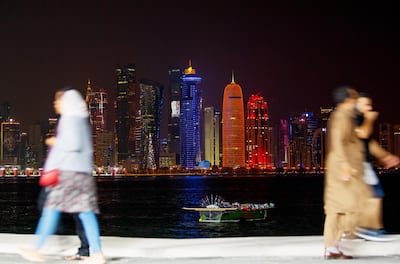A brother of the Qatari emir repeatedly gave shocks to a migrant worker through an electronic dog collar, to intimidate his foreign labourers, a former employee claimed.
According to a sworn statement, Sheikh Khalid bin Hamad Al Thani ran a human-trafficking operation and exploited overseas staff taken to Qatar to work at his car-racing operation in Doha.
The claims of brutality were included in documents filed at a court in Boston, Massachusetts, by a group of US former employees.
They accuse the Qatari royal of crimes including beating his wife’s Indian chauffeur to death.
Sheikh Khalid, 34, is accused of offering lucrative contracts to foreign employees before forcing them to work long hours in harsh conditions, confiscating their passports and failing to pay them.
In the court papers, some of the plaintiffs spoke of being traumatised and financially ruined after being forced to pay bills left by Sheikh Khalid and his entourage as they travelled between Doha, the US and exotic locations.
Their claims emerged after the royal tried to persuade a judge to throw out a case brought by the group of six who are seeking back-payment of wages and compensation.
One of the six, whose roles ranged from racing driver to personal physician, said he watched Sheikh Khalid line up a group of labourers at his home in Doha and forced them to look on as he punished an Indian worker who was blamed for ill-treating a dog.
The act was to “demonstrate what he would do to anyone who crossed him", said American Terry Hope, who was employed by the sheikh for a decade from 2008 to run his car-racing team.
“He placed the shock collar on the worker who had abused Mr Al Thani’s dog and shocked him,” Mr Hope said.
“When Mr Al Thani did this, he lined up all the physical labourers, approximately 10 to 15 people, at his personal residence and made them watch.”
A witness told The National the sheikh repeatedly pressed the remote control button on a unit that operated the collar.
The Indian worker screamed in pain, collapsed and was left with burns around his neck, it was claimed.
Dog shock collars are training devices designed to deliver up to 6,000 volts of electricity for up to 11 seconds at a time to control an animal’s behaviour, welfare groups said.
The Royal Society for the Prevention of Cruelty to Animals, a British charity, said its staff tested the devices on themselves during their efforts to have the devices banned and said they “applied a decent shock – it hurts”.
The devices are banned in parts of the UK because of the harm and suffering they cause. The government promised to make them illegal across Britain.
Police Tasers, designed to bring down violent attackers, peak at 50,000 volts.
Mr Hope also told of a multinational group brought in to work at Doha Race Club, a racing track that Sheikh Khalid owned and built in 2008.
He said Filipinos, Indians, Nepalese, Pakistanis and Kenyans all worked there against their will.
They arrived to be met by a Qatari government official, who confiscated their passports and took them to the club where they were to live and work.
Their documents were kept in a wall safe and stored in stacks by nationality, said Mr Hope, who had access to the safe.
The workers were given three-year contracts and allowed to go home for a month every year if they behaved well, Mr Hope said in his statement.
“Mr Al Thani will hire several people from the same family and if a family member does not return, the remaining family members are threatened and beaten,” he said.
Robert von Smith, a former racing driver for the team, said the Indian and Filipino workers lived in squalor.
Team members handed over cash and their leftovers so they could eat properly.
“The Filipinos lived in old warehouse with makeshift curtains for partitions,” Mr von Smith said in a court statement.
Sheikh Khalid's legal team said the statements were full of information that was “scandalous, impertinent and wholly irrelevant” to the court’s consideration as to whether the case should be heard.
His legal team claimed on Monday that the Massachusetts court had no jurisdiction to hear the case.
The latest allegations follow accusations filed in June that Sheikh Khalid was corrupt, violent, tried to press his staff into killing his rivals and carried out wild schemes such as developing a weaponised drone.
Sheikh Khalid leads KH Holding, a conglomerate responsible for building some of the largest 2022 World Cup venues in Qatar.
He is best known for substantial investments in the drag-racing industry and spent about $100 million on building and competing in teams over three years, the men claimed.



